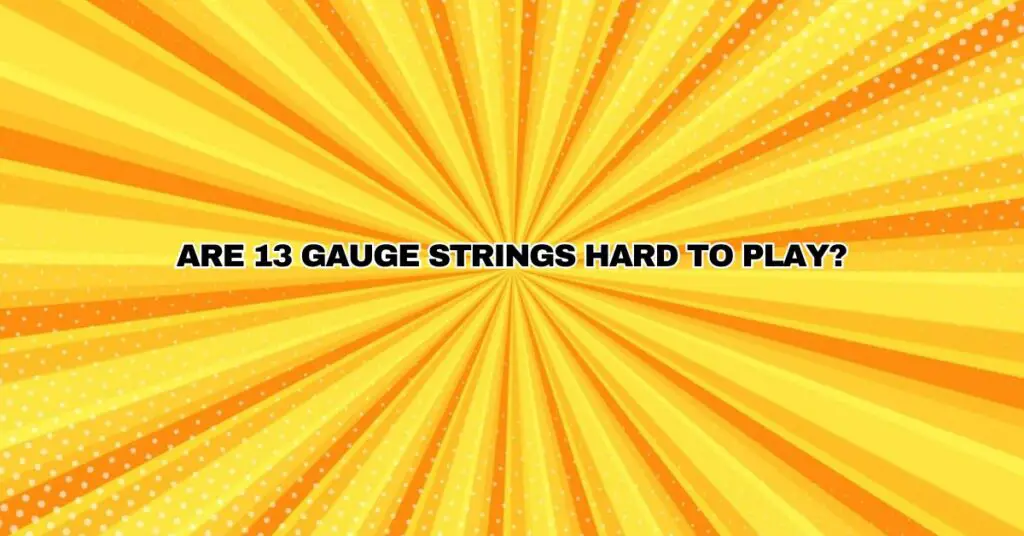The playability of 13-gauge guitar strings, often considered heavy or thick strings, is a topic that generates much discussion among guitarists. The gauge of a guitar string refers to its diameter, with heavier gauges having larger diameters. While 13-gauge strings have several advantages, they can also present challenges, and whether they are hard to play largely depends on the player’s experience, style, and preferences. In this comprehensive article, we will explore the playability of 13-gauge strings, their pros and cons, and who might find them suitable.
Understanding 13-Gauge Strings:
13-gauge strings are known for their larger diameter compared to lighter gauge strings. They typically have a thicker high E string and are used for both acoustic and electric guitars. The gauge of a string set is usually specified by the diameter of the high E string, which, in the case of 13-gauge strings, typically ranges from .013 to .056 inches for acoustic and .013 to .056 inches for electric guitars.
Pros of 13-Gauge Strings:
- Tone and Resonance: 13-gauge strings are favored for the rich and resonant tones they produce. The added mass of these strings contributes to a fuller sound with enhanced low-end frequencies. This tonal quality is highly desirable for genres like blues, jazz, and classic rock.
- Sustain: The thickness and tension of 13-gauge strings allow for extended sustain. This is especially advantageous for lead guitarists who want their notes to ring out and sustain for a longer duration, adding depth and expressiveness to their playing.
- Resistant to Breakage: Heavy strings are less prone to breakage, making them more durable during aggressive playing. They can withstand the rigors of extended use and provide reliability, especially for live performances.
Cons of 13-Gauge Strings:
- Physical Demand: Playing 13-gauge strings can be physically demanding, especially for beginners and players with limited hand strength. The added tension requires more finger strength to press the strings against the fretboard. This can lead to finger fatigue and discomfort during extended playing sessions.
- Challenging Bending: Bending strings with 13-gauge strings can be more challenging. The increased tension means it requires more effort and finger strength to achieve smooth and expressive bends. This can be particularly daunting for players who use extreme string bends in their solos.
- Incompatibility with Fast Playing: Players who prefer fast, intricate solos and rapid scale runs may find 13-gauge strings less suitable. The added tension and resistance make it harder to execute these playing techniques with ease.
- Guitar Setup Adjustments: Thicker strings can affect the guitar’s setup. The increased tension may necessitate adjustments to the truss rod, action, and intonation to maintain proper playability.
Who Might Find 13-Gauge Strings Suitable:
- Blues and Jazz Guitarists: Players in these genres often benefit from the fuller, warmer tones produced by 13-gauge strings. The enhanced sustain and resonance of these strings can be crucial for expressive playing in blues and jazz.
- Slide Guitarists: Slide guitar players often use heavy strings like 13-gauge for their superior tone and responsiveness to slides. The additional tension aids in maintaining proper intonation and minimizing string buzz.
- Players in Lower Tunings: Heavy strings can handle lower tunings with greater stability. Players who use alternate tunings or frequently detune their guitars may appreciate the reliability of 13-gauge strings.
Experienced Guitarists: Guitarists with years of experience and developed finger strength may find 13-gauge strings more accessible. They have the dexterity and endurance to manage the added tension and can harness the strings’ tonal benefits.
Experimentation and Adaptation:
Ultimately, whether 13-gauge strings are hard to play or not depends on the individual player’s level of experience, finger strength, and playing style. For some, they can provide a rich, expressive tone and enhanced sustain, while others may find them challenging to work with. Guitarists interested in 13-gauge strings may need to adapt to the additional tension and practice to build finger strength and agility.
In conclusion, 13-gauge guitar strings offer distinct tonal advantages such as rich resonance and extended sustain, making them popular among certain guitarists. However, their playability can be challenging, particularly for beginners and players with less finger strength. Choosing the right string gauge ultimately depends on your individual playing style, genre, and personal preferences. Many guitarists experiment with different gauges to find the strings that best complement their playing needs and musical aspirations.

